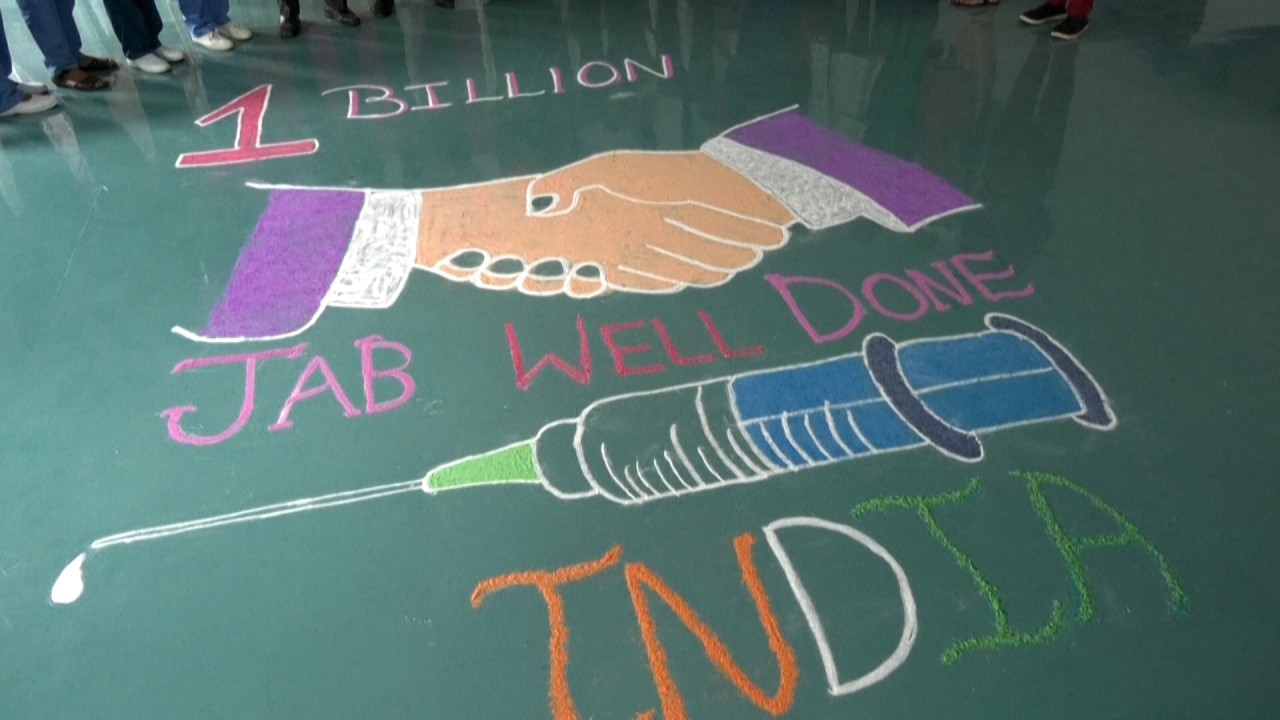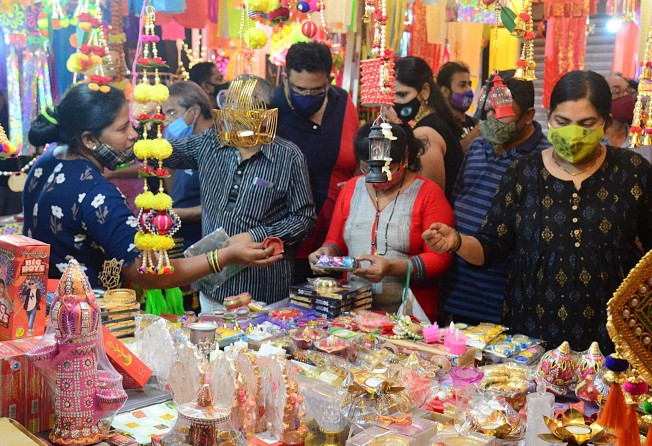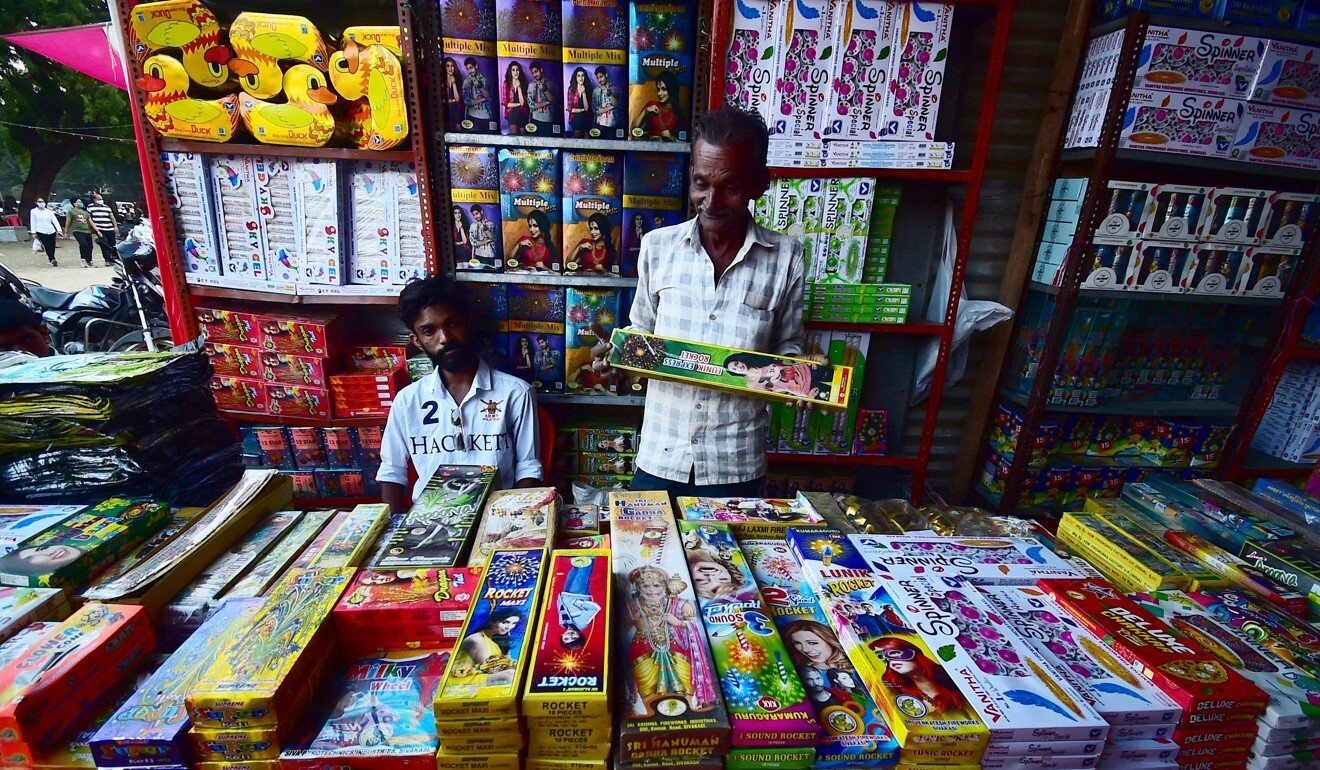
02:14
India administers its 1 billionth Covid-19 vaccine dose despite shortages

Indian trader Rakesh Sharma is thrilled that business has been booming for small vendors like him ahead of Diwali on Thursday.
The business owner at Delhi’s Bhagirath Palace, the biggest market for electrical goods in Asia, said he had seen a footfall increase of 60 per cent from last year, and people are also “splurging more in anticipation of a more joyous Diwali”.
“With Covid-19 infections down and fewer restrictions on mobility, we’re hoping to touch pre-pandemic level profits,” Sharma, 43, said.
After a dire year with two massive outbreaks that killed hundreds of thousands of people, the rate of daily infections has fallen to around 10,000. At the height of the pandemic, India was reporting some 400,000 new cases a day.
More than 1 billion Indians have received at least one Covid-19 vaccine dose, although authorities are now focusing on second shots to meet a target of inoculating all adults by the end of the year.
Sharma’s neighbour Jignesh Parikh, a vendor from the western state of Gujarat, said due to tensions between New Delhi and Beijing over the countries’ disputed border, Indian shoppers have increasingly been avoiding China-made goods.

02:14
India administers its 1 billionth Covid-19 vaccine dose despite shortages
Last year, buyers were proactively asking for Chinese products “as they were cheaper as well as trendy”, but that had now stopped, Parikh said.
“Anti-China rhetoric has reduced the attractiveness of cheaper Chinese products like firecrackers, decorative LED lights, lamps and lanterns, which used to sell like hot cakes ahead of Diwali,” he said. “This year, buyers are mostly opting for home-made goods.”
For years, China has been the biggest supplier of Diwali goods in India – from cheap firecrackers to decorative lights, lamps, gift items, idols of gods and goddesses, home decorations and artificial flowers.
A member of the Confederation of All India Traders (CAIT), which represents millions of small traders, said imports skyrocketed from US$2 billion in 2001 to US$70 billion in 2020, according to a survey carried out by the organisation.
The products are snapped up by millions of families and community organisers ahead of India’s festive season which lasts from October until the new year, with many Indians also flocking to jewellery stores to buy gold.
But amid the strain in ties between the neighbours and Prime Minister Narendra Modi’s call for self-reliance in manufacturing, the CAIT has led calls for consumers to boycott Chinese products.
It has also threatened to stage protests after Diwali if the government does not move to curb online retailers Amazon and Walmart-owned Flipkart, which are increasingly popular with Indian shoppers.
“Like last year … CAIT has given a call to boycott Chinese goods which will result in a business loss of about US$7 billion to Chinese traders as we’re stopping their imports into the country,” CAIT stated in the statement last month.
A recent survey conducted by the confederation in 20 “distribution cities” showed that no orders for Diwali goods, firecrackers, or other items were placed with Chinese exporters by Indian importers this year.
CAIT National Secretary General, Praveen Khandelwal, said the idea is to nudge Indians towards local goods over imported products so that “China doesn’t take control of India’s retail market”.
Rashtriya Kamdhenu Aayog, a department under India’s Ministry of Fisheries, Animal Husbandry and Dairying, has started a campaign to promote locally made cow dung-based earthen lamps, which would be an “eco-friendly alternative to chemical-based Chinese lights”.
Despite the boycott calls, India’s imports from China have continued to rise. Figures from India’s Commerce and Industry Ministry showed Chinese imports shot up by more than 66 per cent to US$27.66 billion, between April and July 2021.
However, some pandemic-weary Indians say they are not too concerned with the government’s nationalistic agenda while celebrating Diwali.
“I don’t care whether the Diwali lamps I buy are made from cow dung or cardboard, or whether they are from India, China or Timbuktu,” said Ashok Jain, a Delhi-based engineer and a father of two. “I just want to have fun with my friends and family. Last Diwali was so dismal that I can’t wait to have a blast this time.”

Some are also concerned with the government’s ban on firecrackers, which are traditionally set off on Diwali.
Particulate matter and toxic smoke from firecrackers has contributed to India’s pollution problem in New Delhi and its surrounding cities during this time of year, which is made worse by falling temperatures, low wind speeds and crop waste burning by farmers preparing their fields for the next season.
New Delhi has banned firecrackers and some states including Punjab have given residents only a two-hour window to set them off.